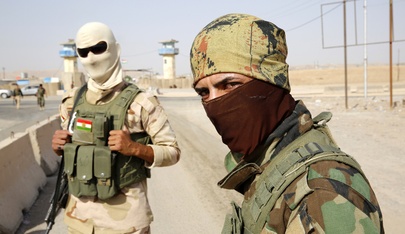In visiting Chick-fil-A's headquarters, which are tucked among the trees on a large plot of wooded land outside of Atlanta, the first thing you'll probably notice, as I did when I visited in the fall of 2011, is the Jesus statue. It's probably three or four feet tall and depicts Jesus washing the feet of a disciple—"a symbol of servant leadership," said a spokesperson. Other religious artwork is on display in the large atrium at the entrance of the building, including Bible quotes and crosses. There is also a fleet of pristine, extremely expensive-looking cars, with a row of model T's and a reproduction of the Batmobile.
This combination of Christian symbolism and display of extreme wealth is a fitting metaphor for the way S. Truett Cathy, the company's late founder, ran his company. Since he opened his first chicken-sandwich stand in an Atlanta mall in 1967, Cathy openly incorporated Christianity into his business, from putting Bible quotes on the styrofoam sweet-tea cups to closing the entire chain on Sundays. He has also made billions of dollars, which explains the decorative sports cars.
On Monday, Cathy died at the age of 93. He was involved in the day-to-day operations of the company well into his 80s; his son Dan is now the president and chairman. Before he died, he created a contract with his children stating that the company should never go public; theoretically, transferring ownership out of the family could jeopardize the business's overtly religious mission statement "to glorify God by being a faithful steward of all that is entrusted to us" and "to have a positive influence on all who come in contact with Chick-fil-A."
In 2012, the company was involved in a controversy over its donations to organizations that opposed gay marriage and advocated the passage of Proposition 8 in California, a constitutional amendment banning same-sex marriage. At the time, Cathy's son, Dan, told the Baptist Press that Chick-fil-A was unashamed of its opposition to same-sex marriage and support of "traditional family values": "We are very much supportive of the family—the biblical definition of the family unit. ... We are a family-owned business, a family-led business, and we are married to our first wives."
His comments were met with widespread protests, including calls to boycott the chain and a couple of college campuses canceling their vendor contracts with the company. Eventually, Chick-fil-A decided to stop making political donations to groups involved with the issue, saying its "intent is to leave the policy debate over same-sex marriage to the government and political arena."
One of the most interesting questions this incident raised was the degree to which people should bring their consumption in line with their religious and political values. Some people saw Chick-fil-A's chicken sandwiches as more than just chicken sandwiches: They were symbols of a conservative ideological position. In buying those sandwiches, some objectors said, people were tacitly supporting the Cathy family's views on homosexuality—and, more importantly, helping them fund opponents of same-sex marriage. On the other hand, this perspective suggested that it's good for people to self-segregate into ideological camps in all spheres of life, even when making basic purchases; as Jonathan Merritt wrote in The Atlantic at the time, "in a society that desperately needs healthy public dialogue, we must resist creating a culture in which consumers sort through all their purchases (fast food and otherwise) for an underlying politics not even expressed in the nature of the product itself."
Cathy's death offers a chance to look at another aspect of this question: What happens when businesses are run in part to express the owner's values? For one thing, the company might end up at the middle of an ideological controversy, like Chick-fil-A did in 2012.
But another result might be subtle brand differentiation. Cathy started keeping a "closed-on-Sundays" policy when he opened his first diner, Dwarf Grill, in Hapeville, Georgia, in 1946, for religious reasons: He didn't believe in "[dealing] with money on the 'Lord's Day.'" Over time, this became part of a broader statement of company values, aimed at recruiting employees and attracting a certain kind of consumer. In its official policy, the company states that "Cathy believes that being closed on Sunday says two important things to people: One, that there must be something special about the way Chick-fil-A people view their spiritual life and, two, that there must be something special about how Chick-fil-A feels about its people." Even though most people would think this policy costs the company money, Chick-fil-A claims it "[attracts] individuals who want to be associated with an organization with a values-based vision." Cathy once said "I feel it’s the best business decision I ever made."
Even though the company's religiously rooted stance on gay marriage might have cost it some customers and hours of public-relations work, it also may have won some customers who identified with its values, similar to its claims about the closed-on-Sundays policy. Under Cathy's leadership, Christianity became a fundamental part of the Chick-fil-A brand, shaping business decisions and helping the company differentiate itself from its chicken-cooking competitors, especially in the South.
The intentionality behind this is no clearer than when you visit the company's headquarters in Atlanta; every aspect of the place is imbued with a latent sense impression of "family values." When I met Truett Cathy in his corporate suite a few years ago, he gave out copies of one of his many books, Eat Mor Chikin: Inspire More People. But the real touch of wholesomeness was in the final piece of swag he gave away: a simple artifact of the traditional American classroom, a wooden ruler, branded with the Chick-fil-A logo.































 In Focus
In Focus
Join the Discussion
After you comment, click Post. If you’re not already logged in you will be asked to log in or register. blog comments powered by Disqus